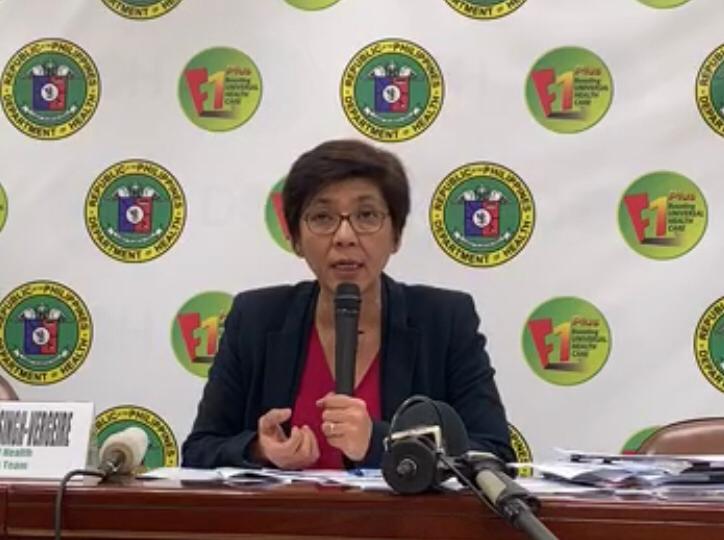
DOH Asec Maria Rosario Vergeire during a press briefing on COVID-19, Monday. Screengrabbed from DOH Facebook.
MANILA, Philippines — The sudden rise in the number of confirmed coronavirus cases in the Philippines does not necessarily mean the bug is spreading fast in the country. According to the Department of Health (DOH), the daily increase in the number of infections may only be an “artificial trend.”
The DOH reported 73 new cases on Sunday, bringing the total number of infections to 380. It said six more patients had died, raising the death toll to 25. Of the total number of cases, 17 have recovered, it said.
Better testing capacity
In a radio interview, Health Undersecretary Maria Rosario Vergeire explained the spike in confirmed cases as the result of the country’s improved capacity to test for infections with the acquisition of more test kits, activation of additional testing centers, and return of late results.
“The capacity of our laboratories is now stabilizing. We’re now catching up with our backlogs. This is because we also have extended the capacity of other laboratories so more tests are coming in,” Vergeire said.
“The rise in the number of confirmed cases in the coming days may only be artificial because of the test results that have been delayed in the past,” she said.
Previously, only the Research Institute for Tropical Medicine (RITM) in Muntinlupa City had the capacity to test patients for the new coronavirus. It received samples from other hospitals and the results were released in 24 to 48 hours.
The DOH said it had activated other “subnational” laboratories for testing for SARS-CoV-2, the new coronavirus that causes the disease COVID-19.
Vergeire said the department was also collating reports from hospitals across the country to establish how many health care workers had been infected.
Some hospitals, she said, had reported staff “exhaustion.” She explained “exhaustion” as health workers who were either tired or in quarantine after attending to patients confirmed to have contracted the virus.
In The Medical City in Pasig City alone, 150 workers, including nurses and resident physicians, have gone into quarantine, according to the DOH.
Meanwhile, the Inter-Agency Task Force on Emerging Infectious Diseases has laid down revised rules requiring local governments to first consult the DOH before buying test kits.
New teams
Cabinet Secretary Karlo Nograles, the spokesperson for the task force, said the group also organized local and regional response teams for incident management. The DOH leads the response clusters, while the Department of the Interior and Local Government leads the management teams, he said.
The task force also allowed the accommodation of distressed or stranded migrant workers in hotels that have closed since the government imposed a monthlong quarantine on the entire island of Luzon last week.
It authorized the Overseas Workers Welfare Administration to issue certifications that migrants would need to seek temporary lodging in those hotels.
The task force also revised the list of exemptions to the Luzon quarantine. (See a complete list of exemptions on INQUIRER.net.)
—With a report from Julie M. Aurelio